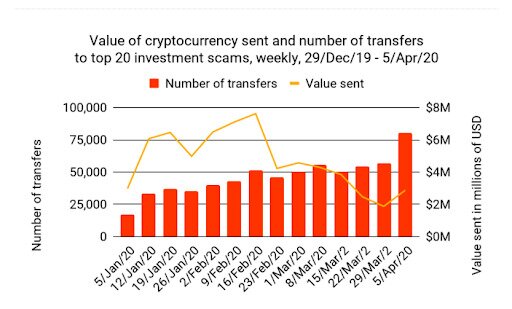- >News
- >Crypto Scammers Get Creative During Coronavirus Outbreak
Crypto Scammers Get Creative During Coronavirus Outbreak
Coronavirus is affecting pretty much every aspect of human life, and cryptocurrency scams are no exception. Yes, while most of the world hides away at home and waits for the coronavirus pandemic to blow over, scammers are still busy trying to dupe you out of your hard-earned crypto.
In fact, the FBI warned on April 13 that it’s expecting a rise in cryptocurrency scams related specifically to the Covid-19 pandemic. Meanwhile, other authorities in other nations had already warned of similar rises.
However, while there is likely to be a rise in attempted cryptocurrency scams over the next few weeks and months, new research from Chainalysis suggests that scams are becoming less profitable. In other words, there may be less reason to be scared than the likes of the FBI want you think, especially if you follow a few sensible precautionary steps.
Increase in Cryptocurrency Fraud Schemes Related To Coronavirus
On Monday, the FBI published a warning to Americans, advising them to be on the lookout for scams where fraudsters attempt to steal money (whether fiat or crypto) and launder it through the cryptocurrency ecosystem.
Worryingly, the FBI advises the public to expect “an increase in the following cryptocurrency fraud schemes related to COVID-19″:
- Blackmail attempts. Here, the FBI is talking about emails that threaten to “infect you and/or your family with coronavirus unless payment is sent to a Bitcoin wallet.”
- Work from home scams. In this case, scammers pose as employers and ask you to accept a ‘donation’ of funds into your own bank account and to transfer them to a cryptocurrency kiosk or account.
- Paying for non-existent treatments or equipment. Basically, scammers try to sell victims coronavirus-related treatments or items that don’t exist, in exchange for crypto.
- Investment scams. With these scams, fraudsters invite you to invest in a new coronavirus-related cryptocurrency or blockchain. It usually sounds too good to be true, and usually ends with the criminals running off with your investment.
These are the main types of coronavirus-related crypto scams the FBI has identified. It warns that criminals are exploiting “increased fear and uncertainty during the COVID-19 pandemic to steal your money and launder it through the complex cryptocurrency ecosystem.”
It doesn’t cite any data to substantiate its claim that coronavirus-related crypto scams are likely to increase or have increased. That said, other agencies and companies have also reported a rise in such scams.
For example, the UK’s Financial Conduct Authority warned about the rise in Covid-19-related crypto scams in March. Likewise, a range of cybersecurity firms have reported similar rises in Covid-19 scams, although not all coronavirus scams involve cryptocurrency.
Regardless, it’s clear that there has been a shift in cryptocurrency scams towards the coronavirus. And given that many people – particularly the elderly and those with underlying health conditions – are fearful of the future, they may be more prone to click on something that offers a cure, or even threatens infection.
Declining Profits, Declining Bitcoin
Fortunately, recent research suggests that the real picture is more mixed and less serious than it might seem. According to a study published by Chainalysis last Friday, cryptocurrency scammers have been making less money since the coronavirus pandemic began. In fact, Chainalysis’ data reveals that the money sent each week to investment scams and Ponzi schemes has declined by 33% since the week ending March 8.
This is good news. But once again, Chainalysis’ report warns that scammers have become more creative and inventive since the coronavirus’ appearance. As with the FBI and the UK’s FCA, they point to a number of new, Covid-19 related twists on long-running scams.
For one, there’s the phishing scam. Scammers send emails to targets pretending to be from the Centers for Disease Control and Prevention (or a charity), for instance, asking the would-be victims to donate some Bitcoin to help fight coronavirus.
Then, as the FBI warned, there’s the blackmail scam, except fraudsters now claim to know where you live and threaten to infect you and/or your family with Covid-19.
Chainalysis isn’t clear on just how successful the above two scams are, simply saying that “it’s unlikely that no scammers have been successful exploiting Covid-19.”
That said, it does have data which shows a 33% decline in the money being sent to fraudulent ICOs and crypto Ponzi schemes. This has dropped from $4.2 million in the week ending March 3, to $2.9 million as of April 10.
Source: Chainalysis
Nonetheless, what the above graph shows is that the number of transfers to the top 20 investments scams is actually increasing. At the same time, the value being sent has declined since March largely because the value of Bitcoin and other cryptocurrencies has also declined over the same period.
Source: CoinMarketCap
In light of all this, it would seem that the coronavirus has done little to make people more wary of investment and Ponzi scams. Instead, it has widened the range of tricks scammers can potentially play on people. And at a time when many may be more vulnerable, scammers may have a better chance of duping victims.
Still, there are a number of things you can do to protect yourself against coronavirus-related scams. We’ve got an entire guide about How to Spot Cryptocurrency Scams. In addition here’s what the FBI recommends:
- Always regard pressure or demands to use a cryptocurrency as a red flag.
- Verify that an agency, vendor or charity is legitimate and actually accepts cryptocurrency before sending payments or donations. Do this by going to its website yourself: don’t click on links in emails.
- Don’t provide your bank account information to someone who isn’t named on your account.
- Conduct extensive research on investment opportunities. Refer to a wide variety of independent sources. If there isn’t much public info on an opportunity, it may be bogus.
- Contact law enforcement if targeted by blackmail or extortion attempts. Don’t pay up.




